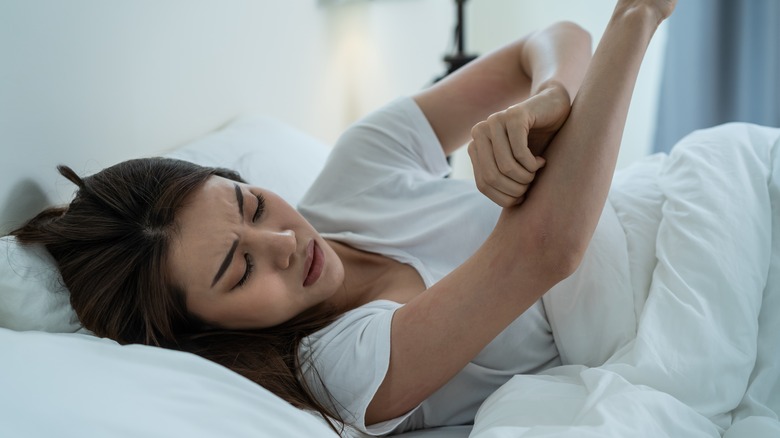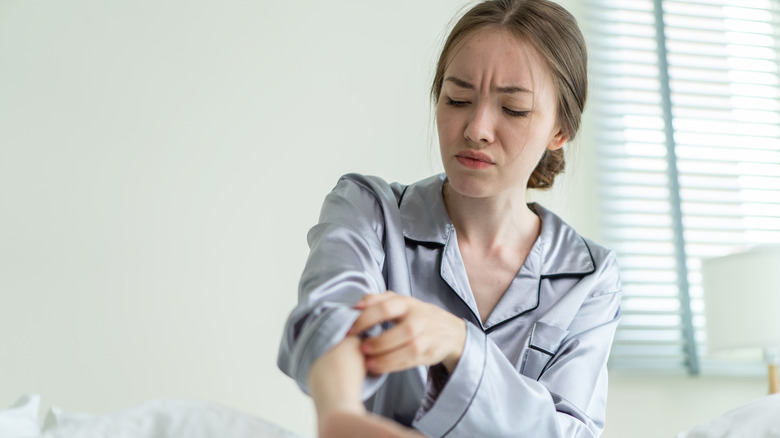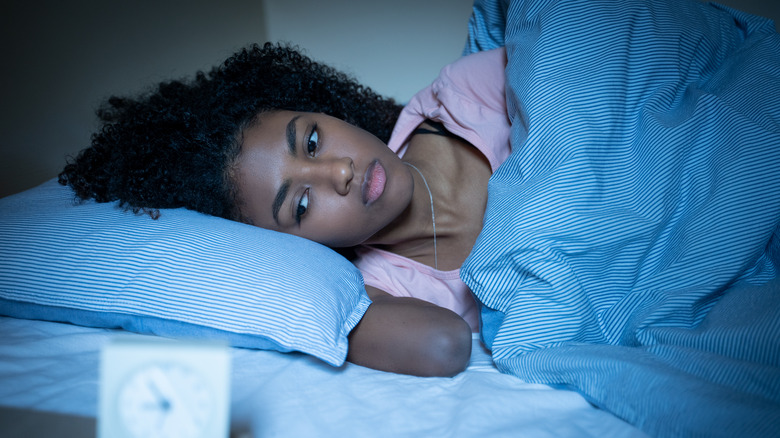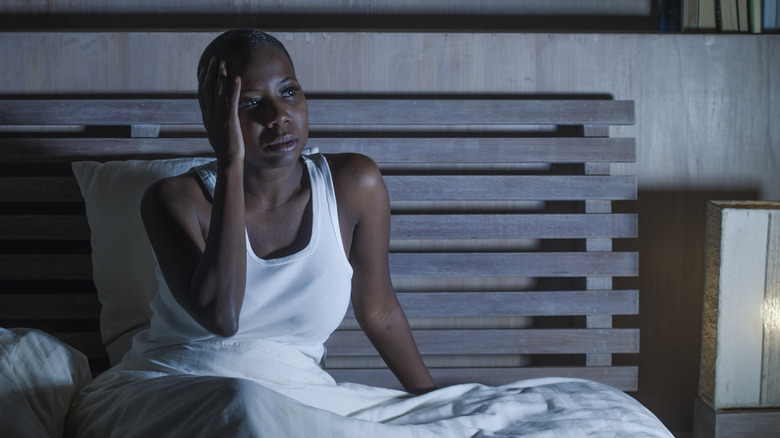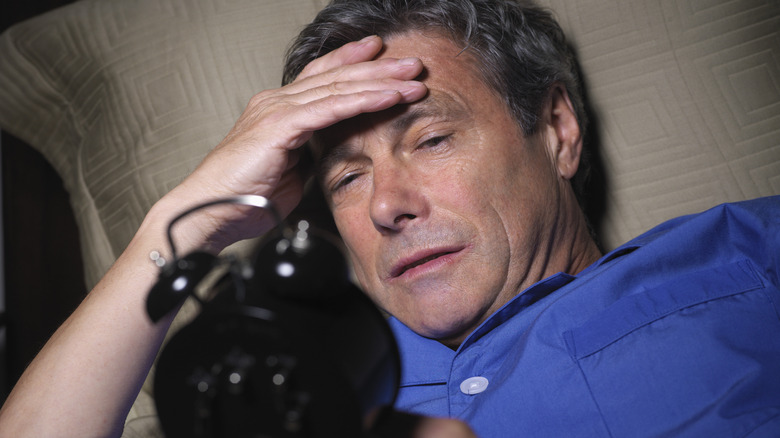The Unexpected Reason Mosquito Bites Itch More At Night
You want to have a fun day at the barbeque with your family, but the mosquitoes have come out in droves. You applied the repellent and burnt the citronella; however, you've still succumbed to a few itchy bumps. With all the hustle and bustle of the day, you didn't think much about them. The minute you lie down to sleep, those itchy bumps flare up. It's not just an illusion; mosquito bites actually itch more at night for various reasons like hormone fluctuations and lack of distractions.
Mosquitos are an annoying little insect that needs to suck blood to feed. When they pierce your skin with their proboscis, they leave a bit of saliva behind, according to the Centers for Disease Control and Prevention (CDC). Your body isn't too fond of this foreign invader and creates an instant reaction. This is why you get a bump that itches. People can react differently to mosquito bites, getting a swollen red lump or small blisters. No matter how you react, it almost always causes an itch that's slightly annoying and hard not to scratch, especially at night. Feed your knowledge needs by learning why mosquito bites itch more at night. While your mind might play a part in the itch, the changes in your skin at night have a lot to do with it as well.
Anti-inflammation hormones are lower at night
The moment that you crawl under your covers, your mosquito bites start driving you nuts. You climb out of bed, wondering what's changed to make them itch all of a sudden. It's not the bites that are changing; it's your body. The level of cortisol in your body decreases when you go to bed, meaning that inflammation flares up. You might know of cortisol as your stress hormone, but it is released by the body to help suppress the inflammation of the mosquito bite, making it less itchy (via Cleveland Clinic). It also plays a vital role in your sleep and wake cycle. So, as night comes, the cortisol in your body naturally decreases. According to Sleep Science, cortisol is at its lowest at about midnight and peaks at around 9 a.m. You might feel most itchy when the cortisol levels are the lowest because the hormone is no longer suppressing the inflammation.
Since your levels are lower at midnight, those five or so bites that you got right before heading in the house could even wake you up from your sleep. To negate the effects of your lower cortisol levels, try putting an ice pack on the itch before bed or even applying some baking soda and water. If home remedies for mosquito bites aren't working, apply a good layer of an anti-itch cream.
Hormone and sleep fluctuations make you itch more
Cortisol isn't the only hormone that naturally fluctuates at night. A study showed that several immune system responses are limited when it's time for your body to hit dreamland (via Pflügers Archiv: European Journal of Physiology). The research states, "Investigations of the normal sleep–wake cycle showed that [...] circulating numbers of immune cells with immediate effector functions, like cytotoxic natural killer cells, as well as anti-inflammatory cytokine activity peak during daytime wakefulness." So, these anti-inflammatory responses, which help with anything from mosquito bites to tissue damage, aren't running at their best at bed time.
While some hormones are lower, other chemicals are higher and can contribute to the itchy feeling. A 2016 study showed that prostaglandin, a tissue repair lipid, is higher at night as it works to repair the tissue from the damage of scratching your bite, per the International Journal of Molecular Sciences. The increase of this lipid is known to also increase the itch. Applying topical acetylsalicylic acid can help suppress this lipid and reduce your need to scratch. The study also noted that people considered to be light sleepers might have a more challenging time with the itch since it's most noticeable during the lightest sleep stage. So, those in the beginning stages of sleep might have the worst time to avoid the itchy feeling of a bug bite.
Your skin changes at night
Did you realize that your blood and skin change at night? Studies have found that your blood flow increases while you sleep, which is vital for removing waste from areas like your brain, according to Penn State. But it doesn't just stop there; the blood flow also increases to your skin. Skin blood flow is important in maintaining different functions of the epidermis. When you sleep, the blood flows through the skin, and your internal temperature increases (via Healthline). The increased movement and heat rising can make your skin feel itchy. Combined with your already itchy bite, it can be impossible to ignore.
The skin also goes through permeability changes due to circadian systems. According to a Journal of Clinical and Aesthetic Dermatology study, the skin becomes more permeable at night, and water is lost. "Because transepidermal water loss is associated with increased pruritus [itch] in cases of atopic dermatitis, this increase in water loss from the skin in the evening coincides [with] increased itchiness at night." Therefore, your mosquito bites are bound to be more annoying when you're headed to bed.
Fewer distractions and mental health conditions also play a role
A million different things are pulling your attention during the day, from your children needing your help to trying to find your car keys. These distractions keep your mind busy, allowing annoyances like itching to go to the back burner. However, as your body relaxes at night for slumber, your mind also calms. You become more apt to notice the itch of the mosquito bite than you might have when talking to your cousin at the barbecue.
Mental health conditions, like depression and anxiety, can also come into play regarding an itchy bite, since they're linked to issues with sleep. "Poor sleep may create difficulties regulating emotions that, in turn, may leave you more vulnerable to depression in the future [...] And depression itself is associated with sleep difficulties such as shortening the amount of restorative slow-wave sleep a person gets each night," sleep researcher Patrick H. Finan, Ph.D., told John Hopkins Medicine. Ultimately, when your body is already struggling to get to sleep due to depression or anxiety, you might focus on the itch more.

